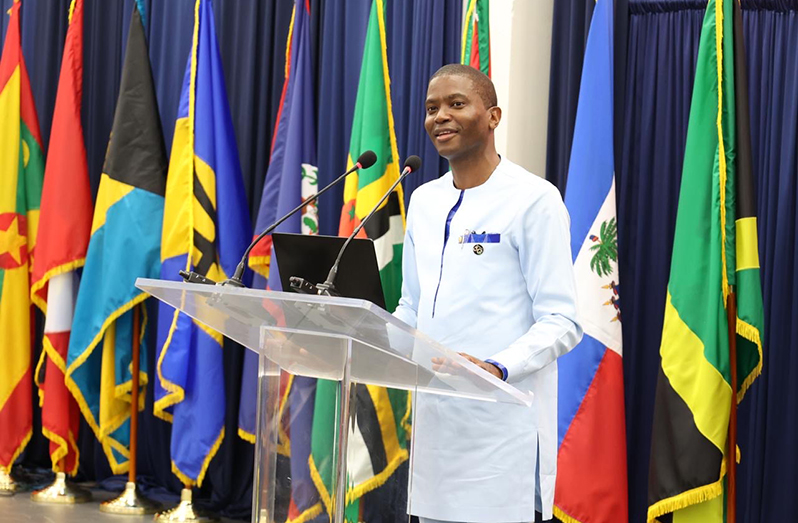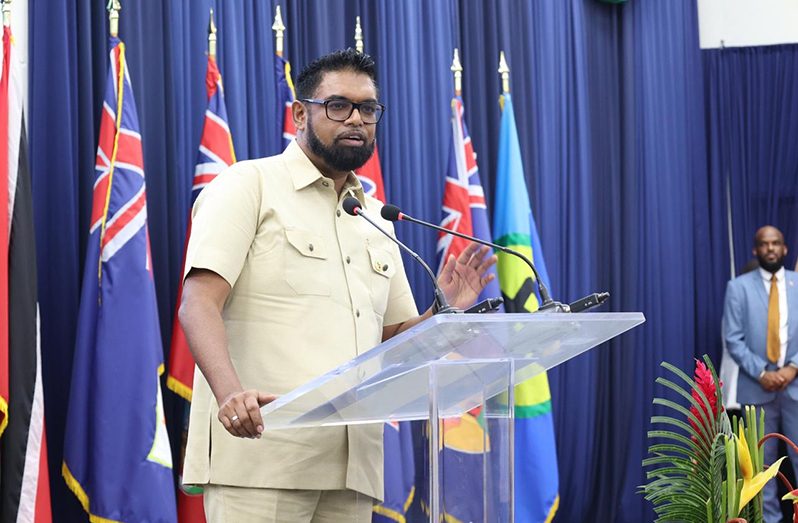–outgoing CARICOM Chair says, highlights Region’s resilience
–calls for more collaboration among regional private sector, governments
–new Chairman says region must shape its own narrative
THE Caribbean faces numerous challenges including climate change, an energy crisis, and inequality, and while leaders have acknowledged these, a holistic approach embracing more collaboration is needed to navigate these crises.
This was according to Guyana’s President and the Caribbean Community (CARICOM’s) outgoing Chairman, Dr. Irfaan Ali, during his address at the 47th Regular Meeting of the Conference of Heads of Government of the Caribbean Community in St. George’s, Grenada, on Sunday.
The President highlighted that although global systems have failed the Region, the member states of the regional bloc have remained resilient in the face of adversity.
“We spent two years redirecting resources for education or infrastructure or agriculture or security to fight COVID, to give our people an opportunity to live. We did this with resources from our budgets. We did this with very little international help; we did this with some strong friendships that those before us would have created for us that we must go back to,” President Ali said.
The Region continues to grapple with shocks brought on by wars, triggering global trends and the increase in commodity prices.
“As I speak to you today, in the last six months alone, we are importing inflation at a record level because of shipping; the cost of shipping increasing by more than 1,000 per cent — 800 per cent,” he said.
Dr Ali further related: “We did not cause that. We did not create a conflict around the world that is driving up the cost of shipping, but we are facing those challenges…the climate crisis did not originate from this Region, the energy crisis did not originate from this Region, the inequality crisis did not originate from this Region.”
Aside from this, the Region remains vulnerable to the threats of climate change and despite contributing less than 10 per cent of the global greenhouse gas emissions, the Caribbean and Latin America continue to bear the brunt of the accelerating climate crisis; that was evident in Hurricane Beryl- a record-breaking category four storm.

He said that the Region will now have to redirect budgetary funding that would have gone to health care or education to strengthen capacity , to rebuild following the destruction brought on by Hurricane Beryl.
“Where is [sic] the voices of the private sector and all those who profess immense love for the Region, in helping the leadership of the Region to call upon the international community to support the redevelopment and to support the rebuilding of the economies that suffered even from this latest hurricane?” Dr. Ali questioned, as he examined the support shown to the region during the recent crises.
Dr. Ali, however, noted that regional leaders are not shying away from the challenges that stand before them. In fact, he noted that the region has been one of the louder voices in championing causes for climate justice, peaceful resolution and finding solutions.
“We have to now fight to ensure we build systems that work for us are not systems that are imposed upon us. We have to build systems that work for our Region,” Dr Ali posited, noting, that this would require more collaboration among the private sector, government, the academic community and other stakeholders.
“We have to trust in ourselves. We have to have faith in each other and we have to have hope about the future. We can define ourselves or continue to allow ourselves to be defined,” the Guyanese leader said.
Meanwhile, Grenada’s Prime Minister and the incoming CARICOM chair Dickon Mitchell, reiterated the Caribbean’s resilience and solidarity in the face of natural disasters, highlighting the devastating aftermath of Hurricane Beryl.
“We must shape our narrative that says we have the same right as everyone else on this earth…we have been tested time and time again and yet we rise,” he said.
Beryl, an unprecedented category four storm, caused extensive destruction upon its arrival in the Caribbean nearly a fortnight ago.
Beryl set a record for the first-ever category four storm in June in the Atlantic, making landfall on Carriacou in Grenada, and wreaking havoc on nearby islands.
St. Vincent and the Grenadines, Jamaica, Barbados, and St. Lucia were among some of the Caribbean States that were affected during Beryl’s passage across the region.
Thousands of people across Grenada and St. Vincent and the Grenadines were left homeless by the storm. Schools, businesses and crops were all destroyed, and, in some islands, fatalities were recorded.
CARICOM states have been rallying together financial aid, manpower and all forms of support to assist the islands that have been affected.



.jpg)








